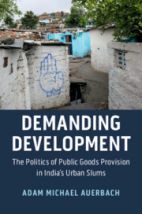Demanding Development: The Politics of Public Good Provision in India’s Urban Slums

The problems faced by the residents of India’s informal settlements are widely discussed. But why do some informal squatter settlements in Indian towns and cities secure services from the state, while others do not? This book engages with that question, drawing on research in two cities: Jaipur (in the state of Rajasthan) and Bhopal (in Madhya Pradesh).
The variety of informal settlements in Indian cities is considerable; it includes notified slums and non-notified slums, as well as informal neighbourhoods that do not fall into either category. But irrespective of this status, there are considerable differences in public service provision between neighbourhoods. Auerbach argues that it is politics that makes the difference, or to be more specific, he argues that outcomes relate to the “political organization of settlements and the degree to which they have been integrated into larger party networks in the city” (page 4). He critiques previous analyses for their failure to identify that such networks of party workers differ significantly between informal neighbourhoods. He argues that settlements with large numbers of party workers are able to secure the attention of government because such workers compete against each other to address the problems of residents and secure their loyalty. The numbers and intensity of party workers vary considerably between settlements. This is related, Auerbach suggests, to the numbers of residents (i.e. the potential vote bank) and to the degree of ethnic diversity. A large population will attract more party workers. And an ethnically heterogeneous neighbourhood fragments neighbourhood leaderships as residents draw on ethnic leaders to solve problems, but also engage with other leaders in their efforts to acquire what they need. This, Auerbach argues, leads to more activity from party workers who have to try harder to secure and keep the political loyalties; hence, unlike previous assumptions, such diversity is associated with improved service provision.
In making this argument, Auerbach challenges readings of low-income neighbourhoods that place emphasis on clientelist relations controlling local residents. Rather he explains that researchers have to understand the complexity of residents’ efforts to ensure that political leaders respond to their needs; and that such needs extend beyond emergencies to everyday requirements.
Drawing on both ethnographic research and a quantitative dataset from households in 111 informal settlements across the cities, Auerbach reports both aspects of the conundrum. He summarizes the living conditions in the informal neighbourhoods, describing deficits in public goods and services alongside the efforts made by residents to improve access. He also brings to life the neighbourhood leaders, many of whom hold a position in political party organizations, and are therefore intermediaries negotiating on behalf of their members and other residents with political elites. And he argues that his research takes a different approach from previous efforts to understand distributive politics because it has a focus on communities (not individuals or constituencies), makes an effort to understand claim making beyond election-related vote acquisition, and gives attention to the competition between neighbourhood leaders and party workers in informal settlements.
Chapter 1 introduces the book. Chapter 2 discusses the significance of India’s urban centres, the scale and nature of state investment, and the organization of party politics. Chapter 3 considers the significance of party workers in India’s informal settlements. Chapter 4 focuses on informal settlement leaders, the services they provide and the strategies that they use to ensure support from residents. Such leaders seek improved services both for such residents and for themselves. The discussion also considers the relationship between neighbourhood leaders and political parties. Chapter 5 discusses the history of political organizing and the extent of public service acquisition in eight neighbourhoods, four in each city. Chapter 6 turns from the ethnographic data to explore survey data from 111 informal settlements across both cities. Auerbach explains the data collection process and the conclusions that emerge from the findings. Chapter 7 draws on the quantitative data to understand why the density of party workers differs between settlements. And Chapter 8 concludes the argument.
Book note prepared by Diana Mitlin
Search the Book notes database
Our Book notes database contains details and summaries of all the publications included in Book notes since 1993 - with details on how to obtain/download.
Use the search form above, or visit the Book notes landing page for more options and latest content.
For a searchable database for papers in Environment and Urbanization, go to http://eau.sagepub.com/

